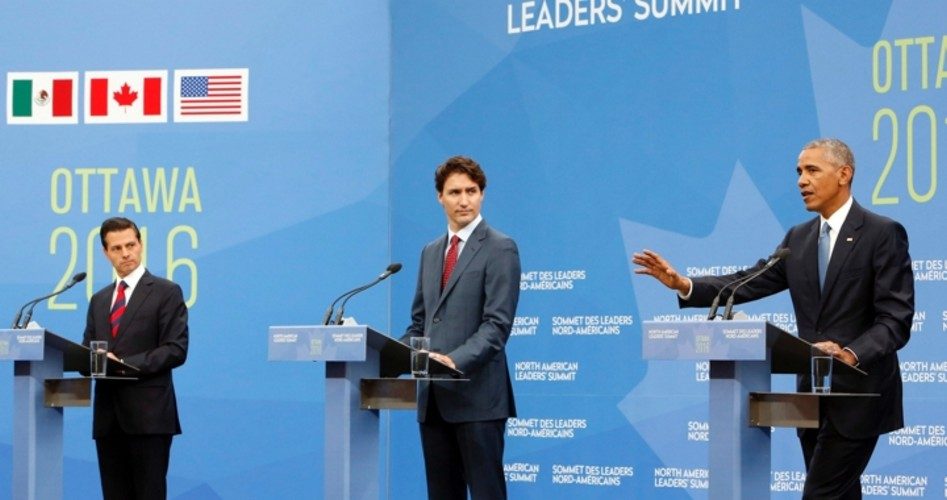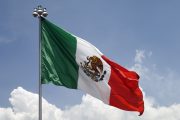
Speaking with Canadian Prime Minister Justin Trudeau (shown, center) and Mexican President Enrique Peña Nieto (shown, left) at the North American Leaders’ Summit press conference in Ottawa on June 29, President Obama rejected the populist label often applied to the presumptive Republican presidential nominee Donald Trump. Obama also responded to Trump’s proposals — made during a June 28 speech in Pennsylvania — to withdraw from trade deals such as the North American Free Trade Agreement (NAFTA) and the Trans-Pacific Partnership (TPP).
“The prescription of withdrawing from trade deals and focusing solely on your local market, that’s the wrong medicine. It’s not feasible,” said Obama.
Obama did not mention Trump by name during the news conference, but members of the press corps named Trump in some of their questions, to which the president replied. One reporter addressed a three-part question to Obama (“And are you going to make a full-throated pitch for the TPP, for your prescription when you’re out on the campaign trail this summer, stumping for Secretary Clinton?”) Trudeau (“you seem to be quite careful when you talk about Mr. Trump. If renegotiating NAFTA or tearing it up would be such a disaster for Canada, why not come out and say that forcefully?”), and Peña Nieto (“in March you compared Mr. Trump to Hitler and Mussolini. I’m wondering if you still stand by that. And how worried are you that this time next year there will be a wall up on your border?”) that mentioned Trump by name.
Obama took the lead in answering the question, joking, “I’m not saying they shouldn’t answer. I’m helping them out a little bit.”
Among the points Obama covered in his answer was our trade relationship with China, which was one of Donald Trump’s major areas of criticism during his speech the day before. (Trump said: “It was also Bill Clinton who lobbied for China’s disastrous entry into the World Trade Organization, and Hillary Clinton who backed that terrible agreement.”)
In his answer, Obama said about China:
When we attend the G20 Summit in China later this year, one of the major topics — which is something that I’ve continually advocated for during the seven and a half years that I’ve been President — is we all have to look at what we can do to boost global demand…. Whether it’s China shifting to a more consumer-based, domestic-based growth strategy as opposed to trying to export its way out of problems. There are going to be a whole host of measures that all of us can take to fortify the global economy, and that should be a top priority of ours.
Since Trump leveled harsh criticism of trade deals such as NAFTA and the TPP during his speech the day before the Ottawa conference, it naturally came up during the reporters’ questions:
One of the candidates who wants to replace President Obama has already said he wants to renegotiate NAFTA and walk away from the Trans-Pacific Partnership, all suggesting that perhaps there’s a growing disconnect between the pro-trade message you’re selling here and the protectionist voices we’re hearing in the U.S. and possibly the Brexit in the UK. So my question is to all three of you: What is your strategy to reverse this growing sentiment?
After Trudeau and Peña Nieto, answered, Obama said, in part:
It’s important for us not to draw easy analogies between what happened in the UK and the EU [Brexit] versus what’s happening between our three countries in terms of trade, or what’s happening in terms of us attempting to access Asian markets through TPP.…
Ordinary people who have concerns about trade have a legitimate gripe about globalization, because the fact is that as the global economy is integrated, what we’ve seen are trend lines across the advanced economies of growing inequality and stagnant wages, and a smaller and smaller share of overall productivity and growth going to workers, and a larger portion going to the top 1 percent….
The question is, what do you do about it? And the prescription of withdrawing from trade deals and focusing solely on your local market, that’s the wrong medicine — first of all, because it’s not feasible, because our auto plants, for example, would shut down if we didn’t have access to some parts in other parts of the world. So we’d lose jobs, and the amount of disruption that would be involved would be enormous.
As Obama continued, he described Americans’ desire to return to the robust industrial economy of past decades as “nostalgia” and asserted that the ability of most Americans to work hard and live a middle-class life “has been undermined far more by automation than it has been by outsourcing or the shift of jobs to low-income — or low-wage countries.”
He went on to say:
And this is why my pushback on both the left and the right when it comes to protectionism or anti-trade arguments is you are right to be concerned about the trends, but what you’re prescribing will not work.
As we noted in our article on June 29, Trump came down very hard on both current trade policy involving NAFTA and our nation’s proposed trade policies under the TPP. He has repeatedly called NAFTA “the worst trade deal in history.” Regarding the TPP Trump said:
The TPP would lower tariffs on foreign cars, while leaving in place the foreign practices that keep American cars from being sold overseas. The TPP even created a backdoor for China to supply car parts for automobiles made in Mexico.
The agreement would also force American workers to compete directly against workers from Vietnam, one of the lowest-wage countries on Earth.
Not only will the TPP undermine our economy, but it will undermine our independence.
The TPP creates a new international commission that makes decisions the American people can’t veto.
Are Trump’s critical views about NAFTA and the TPP just campaign rhetoric or are they legitimate concerns? Part of the answer can be found in an article published by The New American in 2014, entitled: “Trans-Pacific Partnership (NAFTA on Steroids) Threatens Sovereignty.”
That article noted:
The TPP has been described as “NAFTA on steroids,” and a quick rehearsal of the devastation washed up on American shores in the wake of NAFTA will serve as a cautionary tale of the terrors of the TPP.
In its report entitled “NAFTA at 20,” Public Citizen’s Global Trade Watch provided a primer on NAFTA’s enervating effect on the American economy. The paper reports:
NAFTA created new privileges and protections for foreign investors that incentivized the offshoring of investment and jobs by eliminating many of the risks normally associated with moving production to low-wage countries. NAFTA allowed foreign investors to directly challenge before foreign tribunals domestic policies and actions, demanding government compensation for policies that they claimed undermined their expected future profits. NAFTA also contained chapters that required the three countries to limit regulation of services, such as trucking and banking; extend medicine patent monopolies; limit food and product safety standards and border inspection; and waive domestic procurement preferences, such as Buy American.
Some of the specific harm caused by NAFTA is highlighted in the report:
1. $181 billion U.S. trade deficit with NAFTA partners Mexico and Canada
2. One million net U.S. jobs lost because of NAFTA
3. A doubling of immigration from Mexico
4. Larger agricultural trade deficits with Mexico and Canada
5. More than $360 million paid to corporations after “investor-state” tribunal attacks on, and rollbacks of, domestic public interest policies.
Americans who study the subject realize that the domestic legal processes being carried out in secret by the globalists sitting around the TPP negotiating table is, like NAFTA before it, an attack on American laws, American courts, American freedom of expression, American sovereignty, and the American Constitution.
We recommend reading the entire article for more factual information about the dangers of these trade deals.
Photo: AP Images
Related articles:
At Today’s “Three Amigos” Summit, NAFTA Leaders Are Worried About Brexit
Trump Attacks Clinton’s Support for NAFTA and Other Trade Agreements




